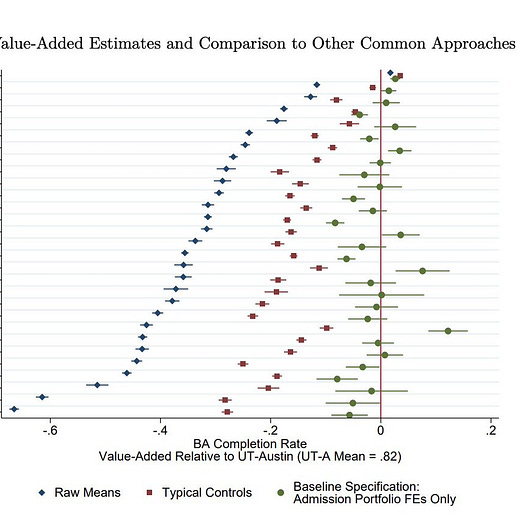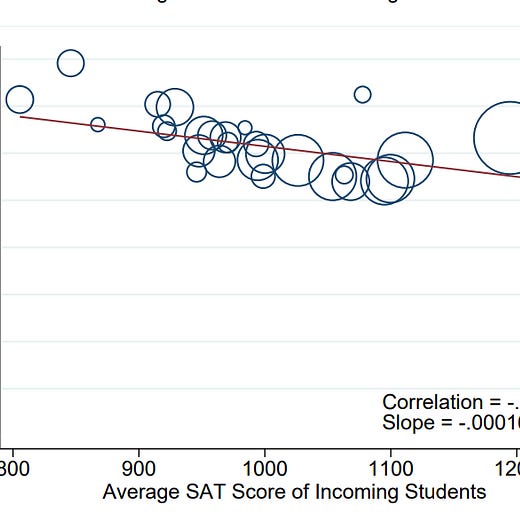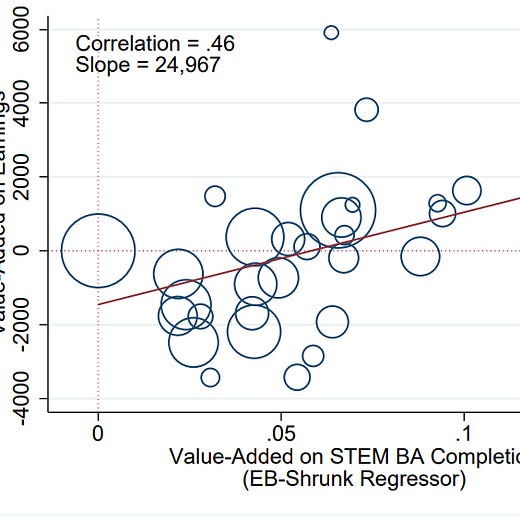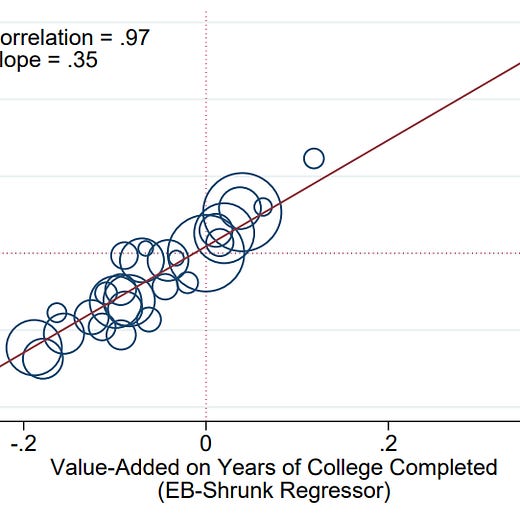Best of #econtwitter - Week of September 26, 2021 [2/2]
Sep 27, 2021
Welcome readers old and new to this week’s edition of Best of Econtwitter. Thanks to those sharing suggestions, over email or on Twitter @just_economics.
This is part two of two, this week. Part one is here.
Paper summary threads

Eva Vivalt@evavivalt
An interesting slide from NBER econ of AI conference. @akorinek et al. surveyed attendees. Seems like economists interested in AI are more pessimistic about human-level machine intelligence (HLMI) than AI researchers, but not by much - maybe 20-40 years’ difference, depending.

6:29 PM · Sep 23, 2021
4 Reposts · 13 Likes

Arpit Gupta@arpitrage
Super cool NBER WP on College Value Add by Jack Mountjoy & Brent Hickman, a modern updating of Dale & Krueger:
- Colleges vary a lot in value-add
- But it's unrelated to SAT scores
- Seems related to BA Completion, STEM degree
nber.org/papers/w29276
ht @gorby_gorbachev




2:25 AM · Sep 21, 2021
8 Reposts · 34 Likes

Katherine Stapleton@KathAStapleton
Great to have the opportunity for @alexlcopestake to present our work on AI in India @nberpubs 2021 Econ of AI Conference
&💯agree with @BetseyStevenson that this conf is one of the most fun - huge kudos to @professor_ajay @avicgoldfarb @joshgans & @ce_tucker 👏
A 🧵on our WP:

4:25 PM · Sep 23, 2021
6 Reposts · 23 Likes

Pinar Yildirim Honold@Prof_Yildirim
How do social interactions shape collective action, and how are they mediated by networked information technologies?
Our paper "Information Networks and Collective Action: Evidence from the Women’s Temperance Crusade," forthcoming in AER, answers these questions.
A thread:

AEA Journals @AEAjournals
Forthcoming in the AER: "Information Networks and Collective Action: Evidence from the Women’s Temperance Crusade" by Camilo García-Jimeno, Angel Iglesias, and Pinar Yildirim. https://t.co/2raQiEIxJl
3:27 AM · Sep 23, 2021
35 Reposts · 211 Likes

Julian Reif@JulianReif
2. The burden fell more on the young than death rates alone suggest. Adults <65 lost more life-years in aggregate than adults 65+. While adults ages 85+ had a death rate 40 times higher than adults ages 35-44, they lost only 2.8 times as many QALYs per capita.

9:34 AM · Sep 21, 2021
7 Reposts · 53 Likes

Lionel Page@page_eco
Fascinating experiment in top scientific conference shows the large part of randomness in peer review:
Submitted papers went to 2 review committees.
👉50% of acceptance decisions were different!
👇 Correlation between the 2 review scores was only 0.55.
arxiv.org/abs/2109.09774

2:03 PM · Sep 23, 2021
78 Reposts · 189 Likes

Chris Conlon@conlon_chris
So Julie Mortimer and I are finally finished(!) with our paper on Efficiency and Foreclosure Effects of Vertical Rebates for @JPolEcon. This paper is about understanding HOW firms use exclusionary contracts to exclude superior rival products bit.ly/3hZFoGX 1/
bit.ly
3:41 PM · Sep 22, 2021
34 Reposts · 157 Likes

Thiemo Fetzer@fetzert
Excited to have this working paper out: "De-escalation technology: the impact of body-worn cameras on citizen-police interactions". We started working *five* years ago. Its hardly the first RCT on #bodyworncameras, but here is a short 🧵on what makes it special... 1/n

11:50 AM · Sep 24, 2021
74 Reposts · 265 Likes

Esteban Moro@estebanmoro
Thanks for your votes. You got it right! In our study we found that (on average) Science Museums are the places with more income diversity. Much more than other museums and also than workplaces and supermarkets. Less diverse places are Pawn Shops and Check Cashing


Esteban Moro @estebanmoro
In our last study https://t.co/npw9J1ltUp, we found places in the US have very different income diversity. Although there is a large spatial variability, we found some patterns. Which places (on average) do you think are more diverse in terms of income of people there?
1:31 PM · Sep 24, 2021
6 Reposts · 31 Likes

Lionel Page@page_eco
Why is overconfidence so widespread, given that it often fosters costly conflits where everybody loses out?
One possibility is that overconfidence brings *relative* benefits: you get more than others.
👇Our paper now published @ Psychological Science. A 🧵
journals.sagepub.com/doi/full/10.11…

12:31 PM · Sep 26, 2021
22 Reposts · 82 Likes
More: free savings accounts; World Bank Doing Business report report (sic); Bayesian analysis of factor zoo; simulating global automation; medical innovation & disparities; effects of fiscal rules;
Paper criticisms
Special pop-up section this week: some critiques of papers which have been featured more-or-less recently in this newsletter

Alexey Guzey@alexeyguzey
New essay: Issues with Bloom et al's "Are Ideas Getting Harder to Find?" and why total factor productivity should never be used as a measure of innovation guzey.com/economics/bloo…
Key takeaways:

6:00 PM · Sep 16, 2021
8 Reposts · 77 Likes

Charles Fain Lehman@CharlesFLehman
As I poined out to Prof. Ang, the paper doesn't distinguish civilian calls for service from officer CFS — it just lumps them together. But if civilian calls were flat, and officers are behind the drop, then there can't be a legitimacy effect.

Charles Fain Lehman @CharlesFLehman
@ProfDesmondAng Hi, Prof. Desmond. How are you differentiating police CFS from civilians from police CFS from officers? The two are often lumped together in call data, and you don't really cover this in the data section.
7:58 PM · Sep 15, 2021
2 Reposts · 9 Likes
Also: useful Reddit (/r/badeconomics) critique of the RDD paper on anti-racist pedagogy, thread
Interesting discussions

Paul Novosad@paulnovosad
What are the most important econ concepts where many non-economists have wrong intuitions with policy consequences?
Some ideas:
- long run economic growth is really great
- pricing carbon correctly would be nice
- building houses lowers house prices
What else?
1:18 PM · Sep 21, 2021
17 Reposts · 191 Likes

Caitlin Knowles Myers@Caitlin_K_Myers
What do economists have to say about abortion? A whole lot, it turns out. Some of the highlights from our brief to @Scotus in the case that will likely decide the fate of #RoeVWade. #EconTwitter @ReproRights 1/

1:38 PM · Sep 21, 2021
138 Reposts · 305 Likes

Chris Blattman@cblatts
My understanding is that they are in between Social Science editors and so it is a tough time to submit. But to me it speaks to limits with the model of professional editors.

John B. Holbein @JohnHolbein1
PSA to social scientists considering submitting to Science right now:
It appears that a hodgepodge of editors are handling social science manuscripts at the moment.
We just had a political science paper desk rejected by a zoologist. "Not a novel enough contribution."
5:27 PM · Sep 23, 2021
3 Reposts · 26 Likes

Bruno Ferman@bruno_ferman
💡Identification in synthetic controls💡
After including SC in my applied metrics class, I had the impression that it was hard for students to get the intuition on the identification assumptions from the main references.
Thought about writing a short thread about it.
1/10
1:30 PM · Sep 20, 2021
56 Reposts · 242 Likes

Shengwu Li@ShengwuLi
Rising soccer star: quits pro soccer to study economics.
Economists: debate whether soccer player’s choice confirms to rational economic model.

Colin Camerer @CFCamerer
@arindube 1/ This is a great debate example about economic intuition.
I do not think that “well, it is his reasonable preference” should *necessarily* be the default conclusion instead of “is there an implicit judgment this 18-year old is making that could be wrong? What’s the mistake?”
8:55 PM · Sep 21, 2021
68 Likes
^also

